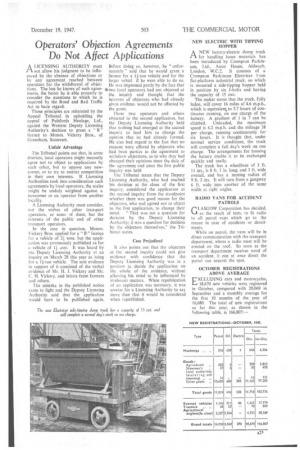Operators' Objection Agreements Do Not Affect Applications A LICENSING AUTHORITY
Page 25

If you've noticed an error in this article please click here to report it so we can fix it.
must ri riot allow his judgment to be influenced by the absence of objections or by any agreement reached between operators for the withdrawal of objections. The less he knows of such agreements, the better he is able properly to consider the questions to which he is required by the Road and Rail Traffic Act to have regard.
Those principles are reiterated by the Appeal Tribunal in upholding the appeal of Pulsfords Haulage, Ltd., against the Western Deputy Licensing Authority's decision to grant a " B " licence to ,Messrs. Vickery Bros., of Greenhorn, Somerset.
Unfair Advantage The. Tribunal points out that, in some districts, local operators might mutually agree not to object to applications by each other, but to oppose any newcomer, or to try to restrict competition in their own interests. If Licensing Authorities took into consideration such agreements by local operators, the scales might be unduly weighted against a newcomer or an operator from another locality.
A Licensing Authority must consider, not the wishes of other transport qperators, or some of them, but the interests of the public and of other transport operators.
In the case in question, Messrs. Vickery Bros. applied for a " B." licence for a vehicle of 21 tons, but the application was erroneously published as for a vehicle of 11 ions It was heard by the Deputy Licensing Authority at an inquiry on March 28 this year as being for a 11-ton vehicle. The sole evidence in support of it consisted of the verbal evidence of Mr. H. I. Vickery and Mr. C. H, Vickery, and letters from farmers and others.
The mistake in the published notice came to light and the Deputy Licensing Authority said that the application would have to be published again. Before doing so. however, he " unfortunately " said that he would grant a licence for a 11-ton vehicle and for the larger vehicl if he were able to do so. He was impressed partly by the'fact that *two local operators had not objected at the inquiry and thought that the interests of objectors who had already given evidenct. would not be affected by the grant.
These two operators and others objected to the second application, but the Deputy Licensing Authority held that nothing had emerged at the second inquiry to lead him to change the opinion that he had already formed. He also had regard to the fact that no reasons were offered by objectors who had been partizs to the agreement to withdraw objections, as tO why they had changed their opinions since the date of the agreement and since the first public inquiry was held The Tribunal states that the Deputy Licensing Authority, who had reached his decision at the close of the first inquiry, considered the application at the second inquiry from the standpoint whether there was good reason for the objectors, who nad agreed not to object to the first application, to change their mind. "That was not a question for decision by the Deputy Licensing Authority; it was a question for decision by the objectors themselves," the Tribunal states.
Case Prejudiced
It also points out that the objectors at the second inquiry could not give evidence with confidence that the Deputy Licensing Authority was in a position to decide the application on the whole ofthe evidence, without allowing his mind to be influenced by irrelevant matters. When republication of an application was necessary, it was unwise for a Licensing Authority to say more than that it would be considered when republished.
NEW ELECTRIC WITH TIPPING HOPPER
ANEW battery-electric dump truck for handling loose materials has been introduced by Crompton Parkinson, Ltd., Astor House, Aldwych, London, W.C.2. It consists of a Crompton Parkinson Electricar 1-ton flat-platform industrial truck, on which is mounted a side-tipping hopper held in position by six J-bolts and having the capacity of 15 cwt.
The maker states that the truck, fully laden, will cover 16 miles at'4.6 m.p.h., which is equivalent° 17 hours of continuous running, on one charge of the battery. A gradient of 1 in 7 can be climbed. Unloaded, the maximum speed is 6.2 m.p.h. and the mileage 38 per charge, running continuously for six hours. It is thought that, under normal service conditions, the truck will complete a full day's work on one charge. The arrangements for housing the battery enable it to be exchanged quickly and easily.
The truck has a wheelbase of 3 ft. 11 ins.' is 8 ft. 1 in. long, and 3 ft. wide overall, and has a turning radius of 9 ft. 3 ins. It will turn from a gangway 6 ft. wide into another of the same width at right angles.
RADIO VANS FOR ACCIDENT PATROLS
GLASGOW Corporation has decided, as the result of tests, to fit radio to all patrol vans which go to the rescue in case of accidents or derail:mertts.
While on patrol, the vans will be in direct communication with the transport department, where a radio mast will be erected on the roof. So soon as the transport department receives word of an accident, it can at once direct the patrol van nearest the spot.
OCTOBER REGISTRATIONS ABOVE AVERAGE
EXCLUDING cars -and motorcycles, 18,670 new vehicles were registered in October, compared with 20,069 in September and a monthly average for the first 10 months of the year of 16,680. The total of new registrations so far this year, as shown in the following table, is 166,807:—












































































